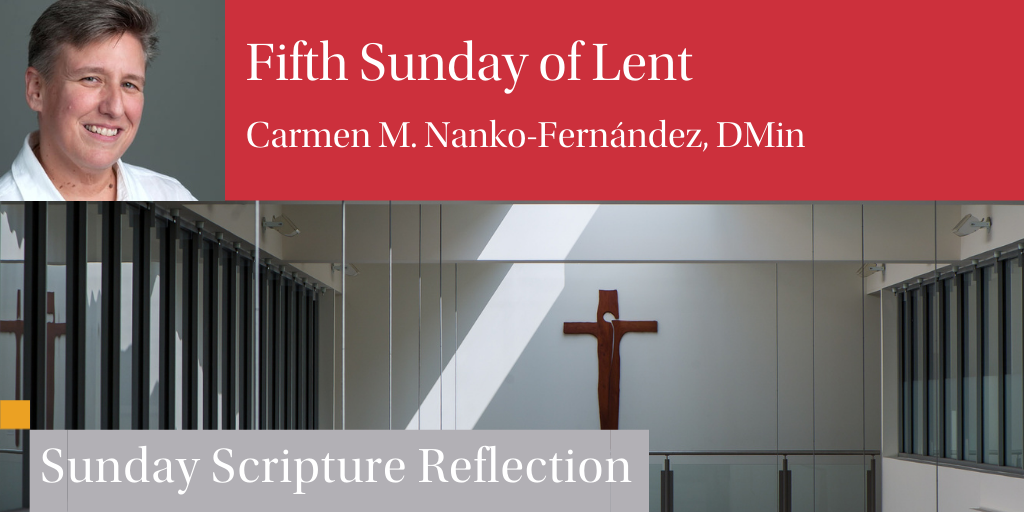

Readings:
Reading I: Ezekiel 37: 12-14
Psalm 130: 1-2, 3-4, 5-6, 7-8
Reading II: Romans 8:8-11
Gospel: John 11: 1-45
“Like Lazarus, she rose out of the bed and walked,” the nurse supervisor said. He was trying to explain to me how my 96-year-old tía wound up on the floor of her rehabilitation facility after midnight a few days ago. The thing is, after breaking her hip in December, she really cannot walk by herself, let alone without the help of a walker. After several hours in the emergency room of the local hospital, and seven staples in her head later, I guess in some ways my aunt really became like Lazarus, restored to her grateful family for whatever time lies ahead.
If you are at Mass this Fifth Sunday of Lent, virtually or in-person, in a parish that has been preparing people for initiation into the Church at the Easter Vigil, then the gospel you may encounter will be the Johannine account of the raising of Lazarus and not the woman caught in adultery. In these circumstances, the Third, Fourth and Fifth Sundays of Lent, no matter the lectionary cycle, incorporate these three gospels in succession: the Samaritan woman at the well, the man born blind, and the raising of Lazarus. Ordinarily these texts are part of the readings for these Lenten Sundays in Cycle A of the lectionary, not our current year C.
These three Sundays are designated for the Scrutiny Rites. The use of these particular gospels has an ancient provenance in connection with preparing people for baptism in the early Roman church.
For those whose spiritual practice is to contemplate the readings in the days prior to their proclamation at Mass, it can be disruptive to expect one thing and encounter another. For the Elect who are drawing closer to their initiation, the sequence of gospels for the three Sundays prior to Palm Sunday serves as a catechesis on the mystery of sin and salvation. The time of scrutiny invites the Elect to search their hearts and ponder deeply their lives in light of the commitment they are about to embrace.
A period dedicated to self-searching,
“The scrutinies are meant to uncover, then heal all that is weak, defective, or sinful in the hearts of the elect; to bring out, then strengthen all that is upright, strong, and good. For the scrutinies are celebrated in order to deliver the elect from the power of sin and Satan, to protect them against temptation, and to give them strength in Christ, who is the way, the truth, and the life. These rites, therefore, should complete the conversion of the elect and deepen their resolve to hold fast to Christ and to carry out their decision to love God above all.” (RCIA #141)
The Rites of Scrutiny and the lectionary readings (that appear out of cycle two out of every three years), can serve as a necessary interruption for the baptized faithful. These rites take place within community, within the context of these last three Sundays of Lent. Because the vast majority of Catholic Mass participants will not experience these rites, we risk complacency in our faith. Granted some of the behavior that has marked and marred our Church in recent years may raise questions for some as to why anyone would want to become part of our brokenness. Our sisters and brothers who choose to be among us give witness through their persistent preparation and authentic introspection. We honor their investment in our community through a solidarity that entertains anew the mystery of our own belonging.
Considering the violent signs of our times, perhaps we all need to search deeply into our own lives, individually and collectively, to examine the destructive mystery of sin. Considering the signs of our seemingly endless cycle of pandemic surges, we may all need to ponder the mystery of life and death and our responsibilities to accompany and protect. When confronted with the reality of Lazarus’s death, Jesus wept.
Two years ago this past week, Pope Francis stood alone in St. Peter’s Square and delivered an “Urbi et Orbi” message as part of an extraordinary moment of prayer and blessing. Confronted with the deadly global reality of Covid-19, Francis reminded us: “By his cross we have been saved in order to embrace hope and let it strengthen and sustain all measures and all possible avenues for helping us protect ourselves and others. Embracing the Lord in order to embrace hope: that is the strength of faith, which frees us from fear and gives us hope.”
While many of us will not experience the Rites of Scrutiny this Sunday, perhaps our times call for interrupting our cycle of expectations. May we accept an invitation to join our Elect by sharing in and pondering the very same readings that teach us how there is hope even in confronting death.
Carmen M. Nanko-Fernández, DMin
Professor of Hispanic Theology and Ministry
References:
Rite of Christian Initiation of Adults. Approved for Use in the Dioceses of the United States of America by the National Conference of Catholic Bishops and Confirmed by the Apostolic See. (Study Edition), Chicago, IL: Liturgical Training Publications, 1988.
Pope Francis, “Moment of prayer and ‘Urbi et Orbi’ Blessing,” (March 27, 2020), https://www.vatican.va/content/francesco/en/homilies/2020/documents/papa-francesco_20200327_omelia-epidemia.html.